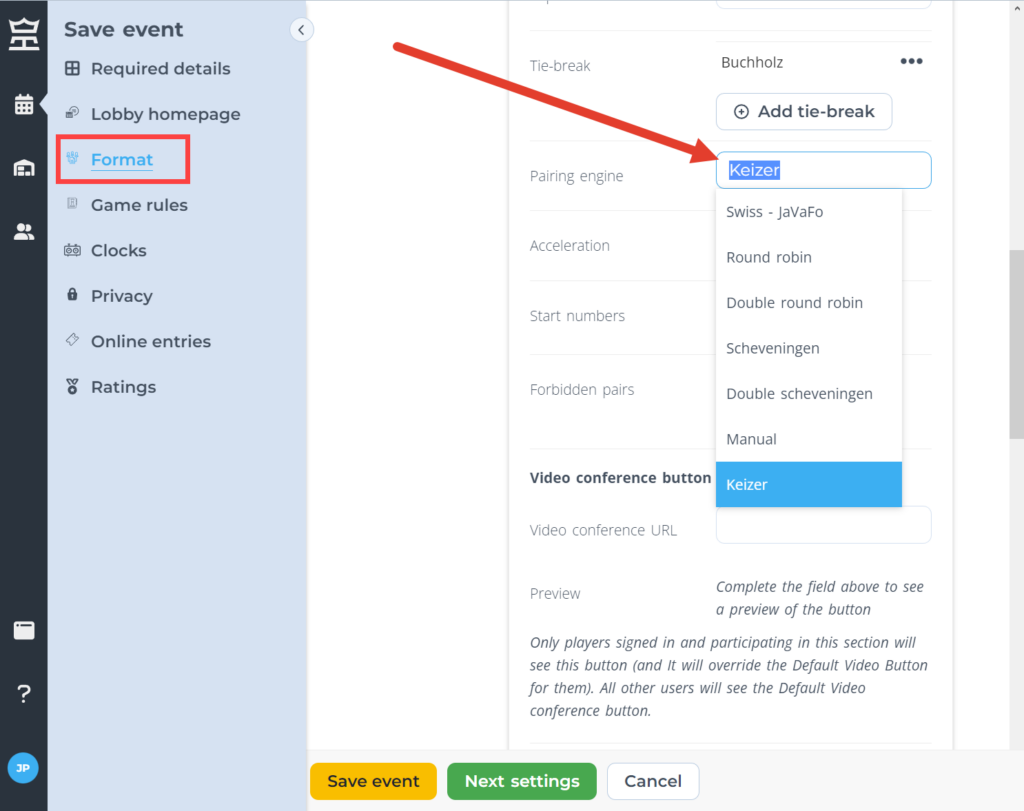Using Swiss pairings, or FIDE Approved Swiss Pairings, to run your tournament is great for serious events, or competitions with a large number of players. But sometimes you need something more flexible, and Keizer pairings is a good option.
A number of chess clubs use Keizer pairings to pick opponents, especially small clubs who have ‘drop-in’ style of attendance. The beauty of Keizer is that it is designed to cater better for absent players than a Swiss.
Trying to find a description of the Keizer pairing system was not easy – the best I could find was here. We have implemented something as simple as possible with the main difference from a Swiss paring method being:
You will ALWAYS find a legal pairing
That means, yes is possible to play the same opponent twice during a single tournament. Or three times. But each round the pairing will look for the most interesting and competitive opponent for each player.
Pairing principles of Keizer
The pairings have a more complex background scoring system, and the scoring is recalcluated every round. This means you might get 14 points for winning your first round – but after the third round that first round win is only worth 10 points. I know, complicated.

Round 1 pairings are done 1 v 2, 3 v 4, 5v 6 etc. And each round opponents are picked in the same fashion. Always pairing the two players closest to each other. Where possible, the system will not pair:
- The same opponent 3 times in a row
- Any player to play 3 whites or 3 blacks in a row
- Any player with total colour balance greater than +2
- A player with a Bye 3 times in a row
Winning a game gives you the Keizer score of the opponent, draw gives half and losing gives you 0 points. The Keizer score is allocated for each player starting with the highest ranked player and descending by 1 point each time until the bottom ranked player has a score of around 1/3rd of the top player.
Working on
- Updating our Game Page to make the online games experience better
- Updating the design of the tables on our pages
- Support for adding Deputy Arbiters
As always, we’re keen to hear your feedback about our user friendly pairing program. How can we make your life as a chess tournament organiser, arbiter or TD, easier!
Kind regards,
DAVID CORDOVER

Hello,
Thank you for the article, and for Tornelo 🙂
Do you have an example showing up how to properly setup a tournament using Keizer pairings? I’ve been doing some tests and always end up seeing the regular 1/1.5/0 score instead of the “keizer score” mentioned in this article.
I’m also interested in seeing how to configure absent/present players at each round (I might not be doing that correctly).
Thanks!
Hello Vianney!
For pairing purposes there are Keizer scores, but for Standings the scores are recorded in the traditional manner, by default 1 for a win, 0.5 draw and 0 for a loss, or as per your changes in the settings.
There are several ways to deal with absent/present players. From Arbiter point of view you can select any player on your Start list and choose their status in the right-hand Panel. The status is “Playing” by default, but you can also Withdraw, Block or Delete a player.
Furthermore the same Panel allows you to setup Skipped rounds by the player in case they will not participate in a specific round. However, this is something the players can select themselves and we recommend to encourage your players to do so and take advatage of this feature.